Ruygrok, Bernardus Ludovicus Josephus
Before we start this biography we have to settle the problem of the spelling of his name. In this case the muddle between the Dutch spelling and the English/American spelling. Holland American had that challenge with their ships as well. Hence the cargo ships were “dijks” until 1923 and then became “dyks”. Something similar must have been going on with our captain because when he was born his name was spelled as Ruijgrok and when he died it was spelled as Ruygrok.
He was born on 18 August 1894 as Bernard Ludovicus Josephus Ruijgrok. in the town of Arnhem in the East of the Netherlands. Of the Roman Catholic faith but not with the extra name of “Maria” as was often the case in Dutch R.C circles. His father Jacobus Johannes Ruigrok was a music teacher and his mothers name was Catahrina Johanna Francisca Brantjes. There were 7 children and he was nbr. 3 He was born in the Driekoningen straat 16 in Arnhem. The house does not exist anymore as it has been replaced by a school. Un verified information indicates that the house was damaged during operation Market Garden in 1944 . (a,b)
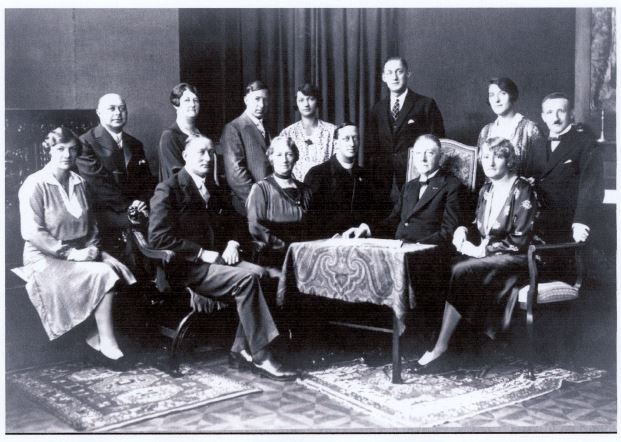
The family Ruygrok in 1930. Captain Ruygrok is second from left sitting at the table. (a)
He joined the oldest Maritime Academy in the world. ” De Kweekschool voor de Zeevaart” in Amsterdam on 01 September 1910. He is noted twice in the school records for winning a prize in Mathematics and ends school as nbr 4. of 17 cadets.
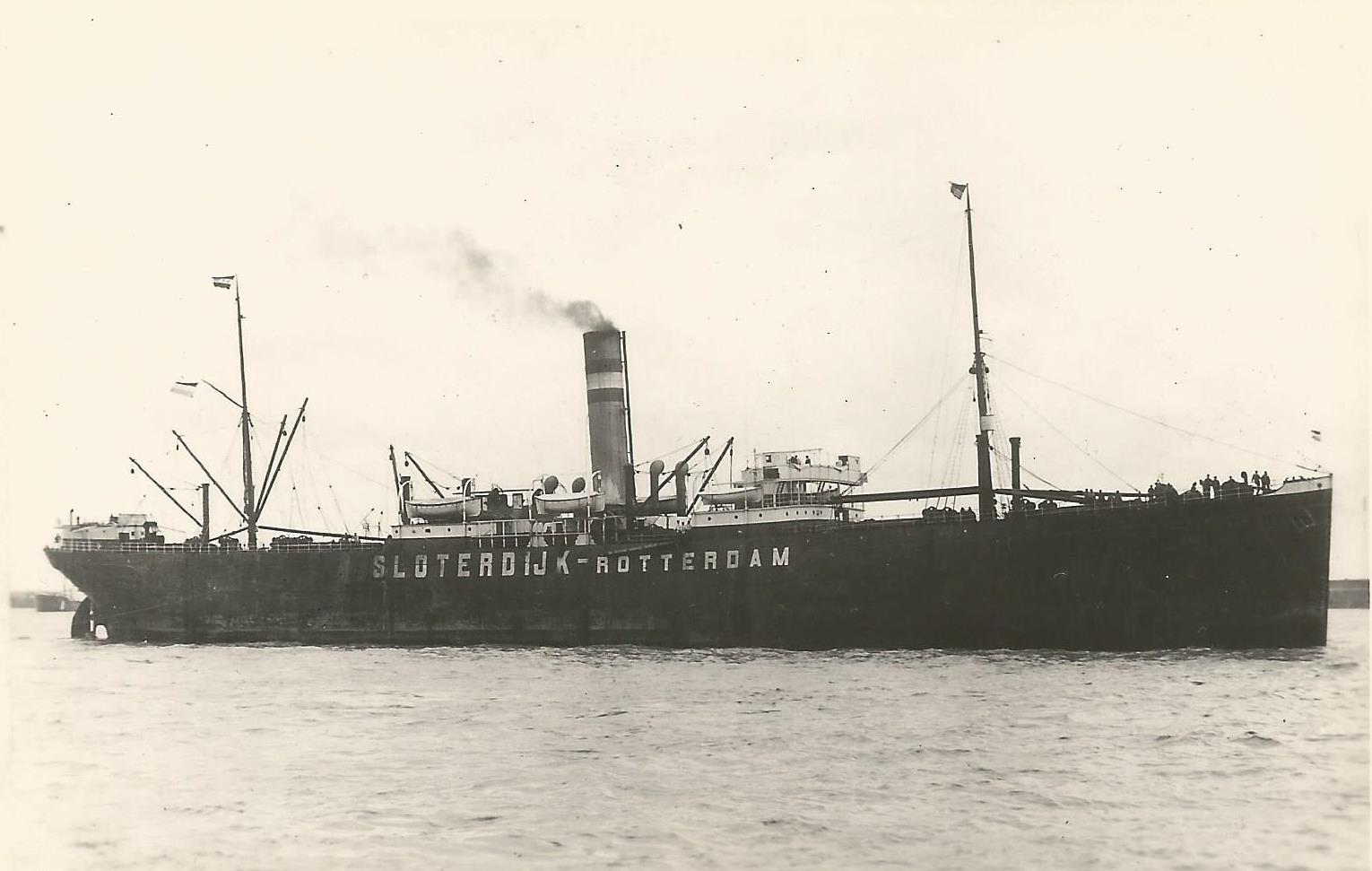
The ss Sloterdijk (I) of 1901 This was one of the first cargo ships of the Holland America Line after they decided to split their ships into Passenger ships and cargos ships around 1900. This photo was taken during World War I, note he neutral letting on the side so not so long after Cadet Ruygrok sailed on it.
He is then placed as cadet on board the ss Sloterdijk (I) on 19 August 1912 and returns to school on 31 August 1913 with very good sailing reports. Then he passes his 3rd mate exam on 31 October 1913 and is dismissed from the Maritime Academy on 21 November when he is taken back by Holland America. On 08 December he joins the ss Rotterdam (IV) as a 4th. officer but is by April 1914 back on the ss Sloterdijk. Five months later his country needs him as it mobilises due to the threat of the First World War and he is assigned to the Royal Navy. (ED: there are no entries in the company records which indicate that he kept his Royal Navy connection going except for a short spell in July 1916; but he might have as the company was really encouraging all officers to do so) By January 1915 it was quite clear that the Netherlands would be able to maintain its neutral status and he returns to Holland America and is assigned as 3rd. officer to the ss Maasdijk.
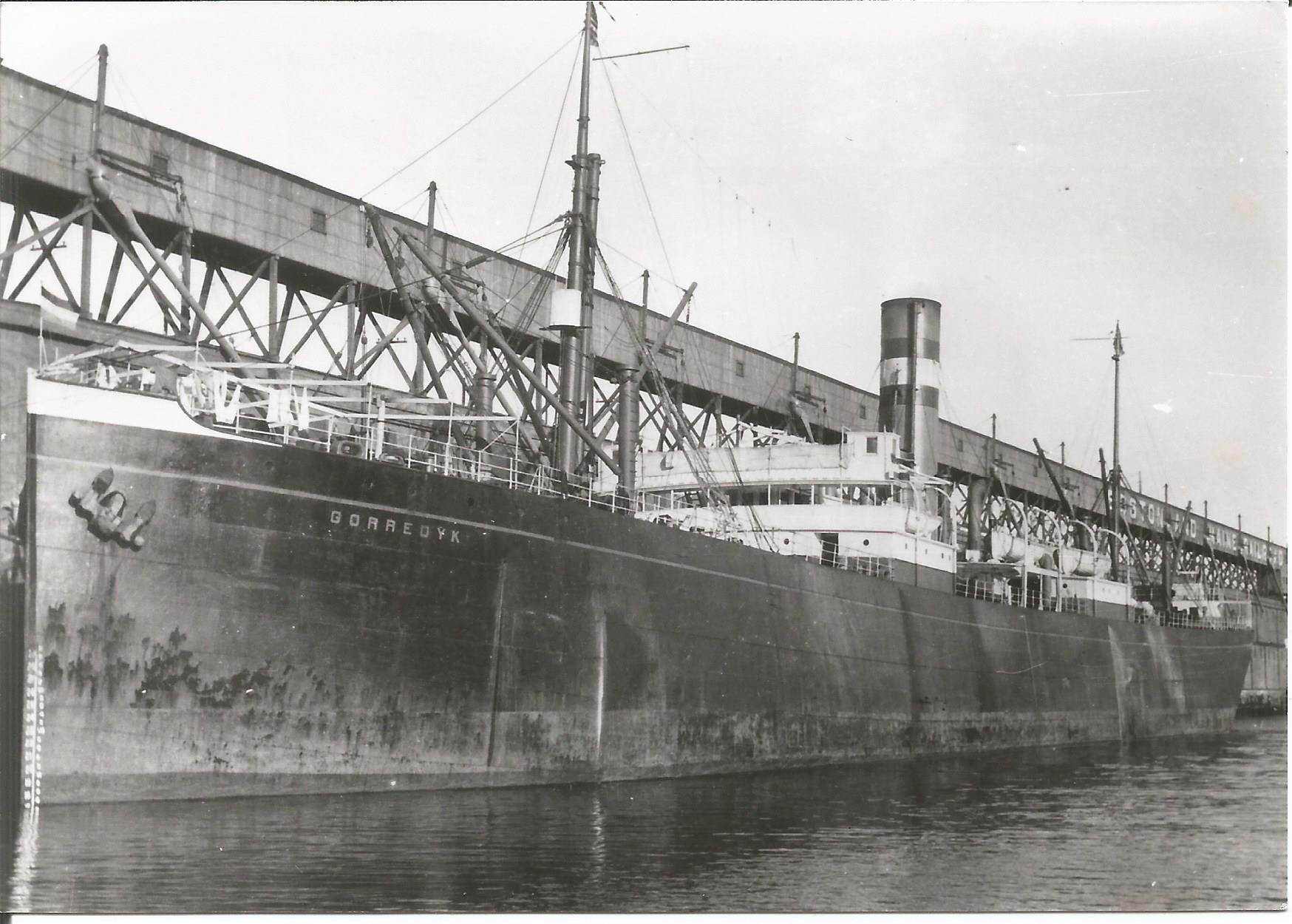
The ss Gorredijk (II) which was brought under American flag in 1918 and was used as the USS Gorredijk for general cargo work. to support the war effort in Flanders.
He was on the ss Gorredijk by January 1918 as 2nd Officer and still on board when in March the US Government seizes all foreign ships in US ports. As the Netherlands is neutral, the crews can not stay on board and are all (together) returned home with the ss Nieuw Amsterdam. But by June he is back on the fleet, being assigned to the ss Noordam (I)
While ashore in February 1919 he manages to find time to marry on 14 February Helena Maria van der Meulen at Arnhem. (Daughter of Cornelis van der Meulen and Anna Catharina Sijbecarspel who is listed as a Boarding house proprietor) Eventually there were four children, Bernardus (Born 17 September 1921), Cornelia (Born 01 September 1923), Annie (Born 12 March 1925) and Jacobus (Born 13 May 1927) .He went back to sea sailing the ss Noordam.
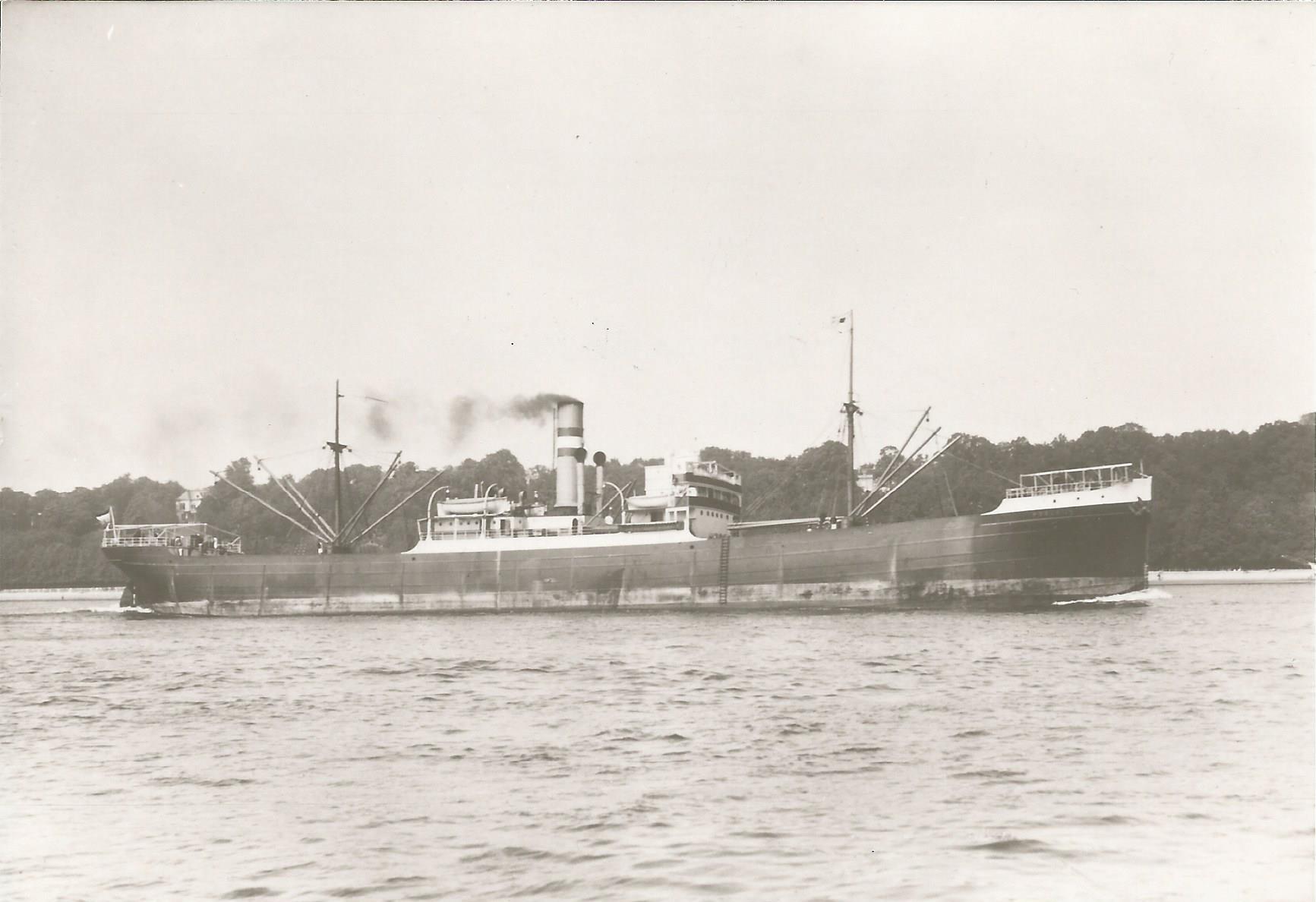
The ss Poeldijk (I) which became the captains on/off command for relieve periods.
Un until 1922 when he is promoted to Chief Officer, he mainly sails on the passenger ships. Then on 24 August 1926 he is promoted temporary to Captain to do a fill in on the ss Poeldijk (I) This is repeated in 1927 and 1928 when he is in command for the coastal voyage from Rotterdam to Germany and back to Rotterdam, while the regular captain took a few days off. The the depression arrives and he remains Chief Officer until 1939 as there is no fleet expansion and many ships go into a=lay-up. By now he almost permanently sails on the passenge rships including the flagship the ss Statendam (III).
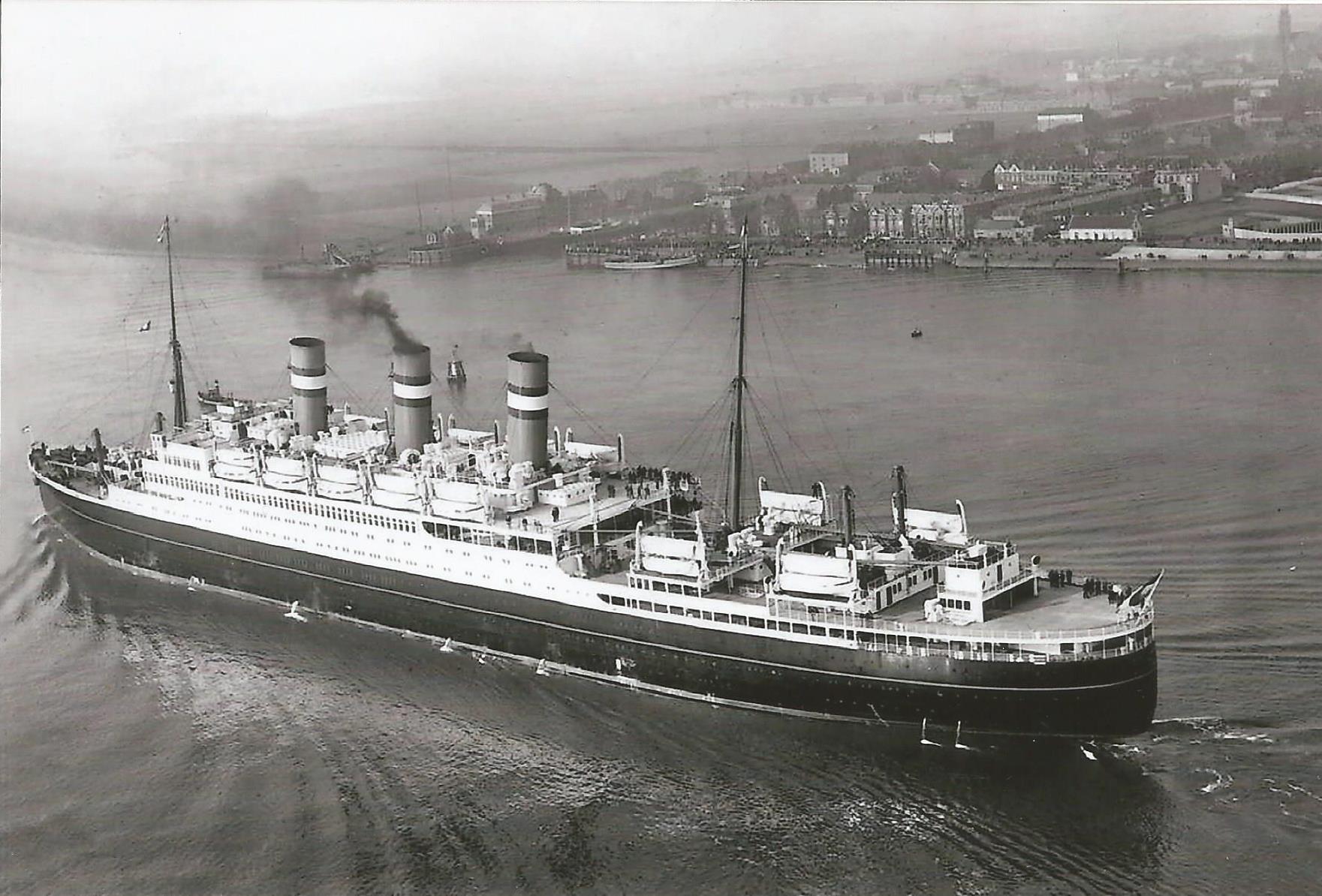
The ss Statendam (II) She entered service in 1929 and until the arrival of the ss Nieuw Amsterdam she was the flagship of the fleet.
When reaching the flagship, it is normally the indication that the next assignment will be captain of a cargo ship, due to the Holland America system of being assigned to every more senior ships in the fleet and upon promotion starting again on the smallest / oldest ship.
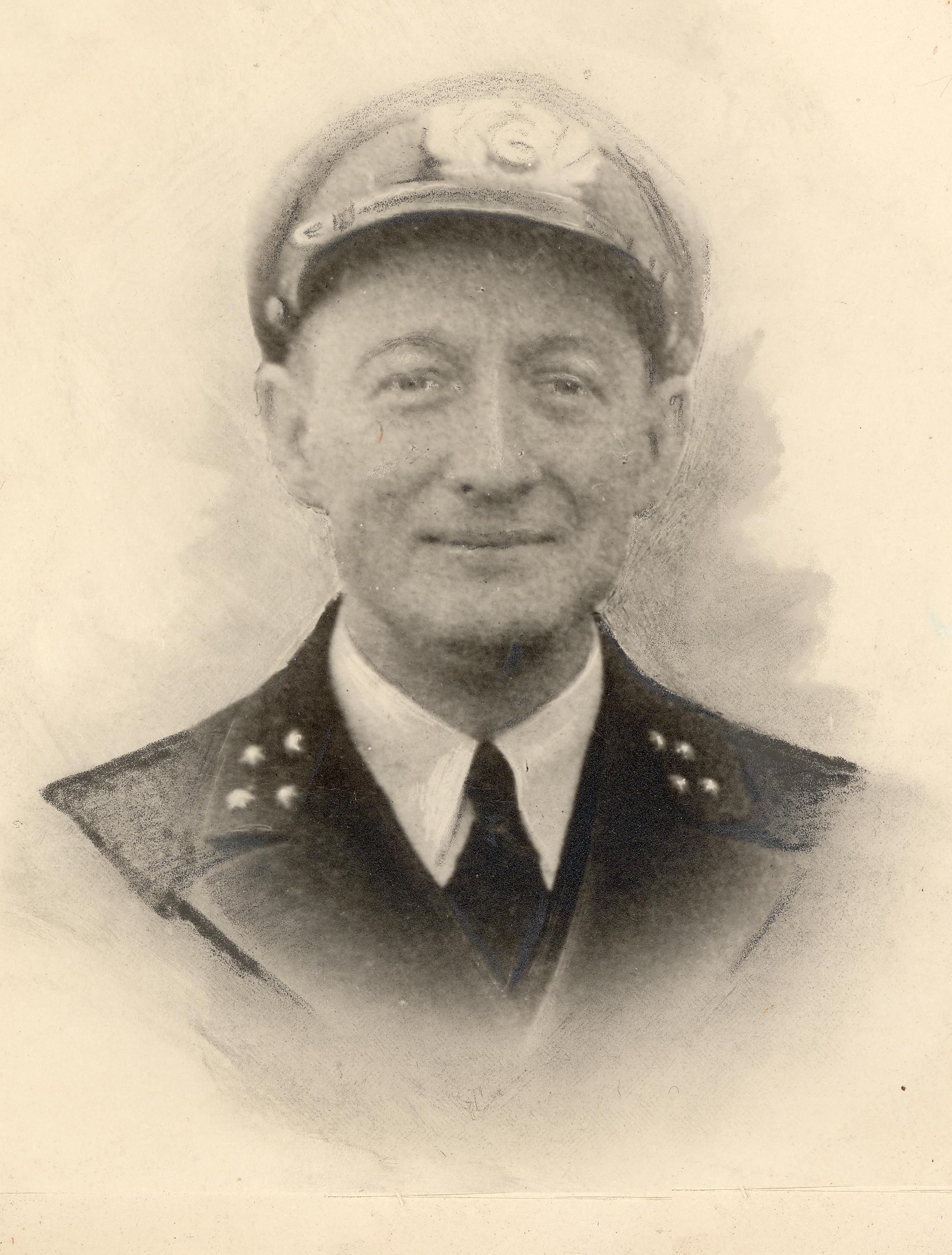
Captain Bernard Ruygrok. This photo must have been taken while commanding a ship as the gold rim (indicating captain position) can be seen on the edge of the cap.
This turns indeed out to be the case and 20 May 1942 he is promoted to Captain on the ss Breedyk at Capetown, the previous master, Captain Libau. The ss Breedyk was in allied service and as a cargo ship sailed all over the world. For his work as a captain he was award the Cross of Merit by the Dutch Government on 25 December 1941. It is assumed (subject to full verification) that he received this decoration for the episode of the ss Volendam being torpedoed with 300+ children on board and then bringing the ship safely to port where it could be repaired.
Then on 20 May he takes command of the ss Breedyk in Capetown and sails eastbound to the Far East to load cargo in the British colonies. It turns around at Calcutta and after loading a general cargo it heads for England. There are stops at Cochin and then at Capetown for fuel. The latter was a major junction in the world wide “war transport” routes and often crew changes took place here. After re-fueling the ship continues up the coast of North Africa with Liverpool as final destination. On 14 September at 23.05 hrs. the ship was struck by a torpedo of the UB 68 near the stern and the captain orders all the lifeboats to be prepared but not yet to be lowered as he wanted a full report first. (Position: 05.05° S / 08.54° W approx. 150 miles south of Cape Palmas) The engineers report that the water is rising quickly with hatch 6 near the stern already filled.
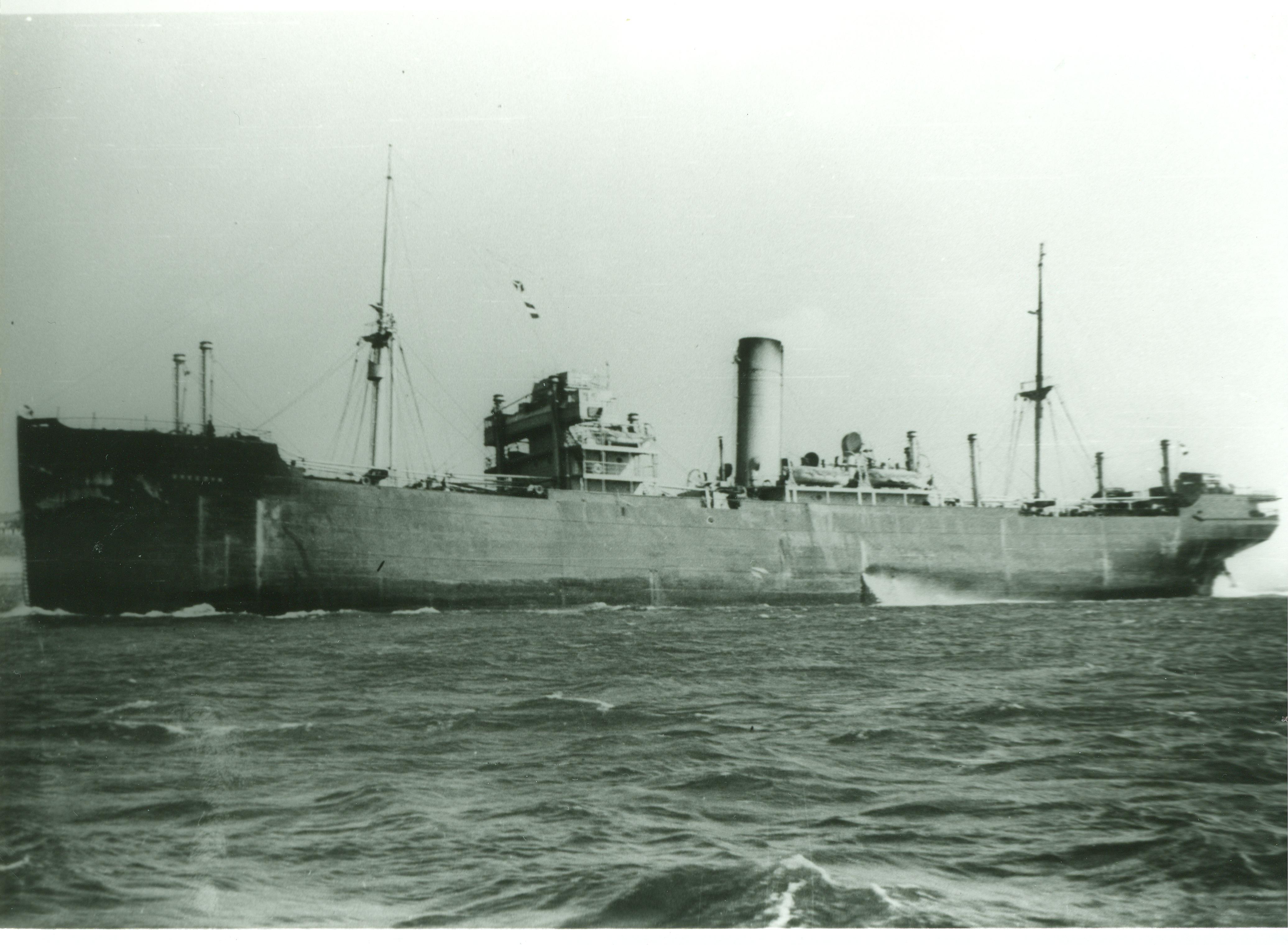
The ss Breedyk. Seen here in war time grey. She had entered service in 1922 as one of the 10 B class cargo ships. Handed over the British in 1940 she was used mainly on the North Atlantic convoy service between New York – Halifax and Liverpool. In the spring of 1942 she was diverted for the first time to the South Atlantic,
The boats were then made ready but Capt. Ruygrok asked them to wait a moment while he went to his cabin. (ED: We can only speculate why but my guess would be to pick up the ships log and other official papers as those would be extremely important during the subsequent hearing at the Board of Inquiry) But the ship was sinking so fast that the boats had to be lowered and at 23.18 hrs. the ss Breedyk capsized and sank. Captain Ruygrok was never seen again. Apart from him one servant died as well. Four boats were safely lowered and three of them landed on September 16 near Freetown and 37 crew were safe. The fourth boat has first picked up 2 more crew who were in the water and that brought their total on board to 16. Three of them were transferred to another boat and that left 13. This boat then got separated from the rest. They finally landed at the Ivory coast on 27 September and were arrested there as P.O.W’s by the French Vichy Government and interned in very bad accommodation. It was not until December 12 that the camp was liberated as a result of the Allied invasion in Africa. Apart from the ss Breedijk also the Dutch ss Gaasterkerk was torpedoed by the same German submarine in the same area. Normally there was not so much submarine activity so far south but the German high command had initiated “Operation Eisbaer” to isolate Capetown as an allied traffic hub.
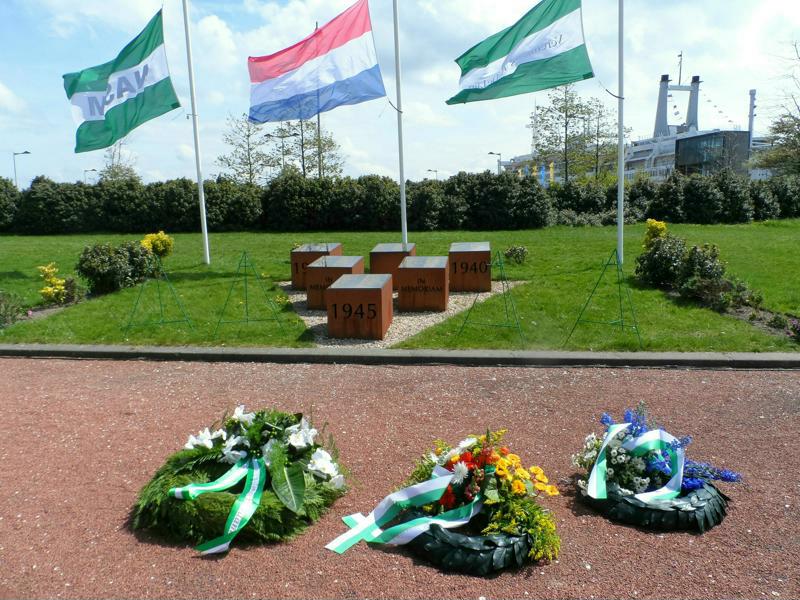
The HAL War memorial at Rotterdam, opposite the dock of the ss Rotterdam (V) (Photo courtesy: www.verenigingdelijn.nl the association of old Holland America Line employees)
Captain Ruygrok is remembered on the company War Memorial in Rotterdam (see above) and at the War memorial of his hometown Voorburg/ Leidschendam. (See below)
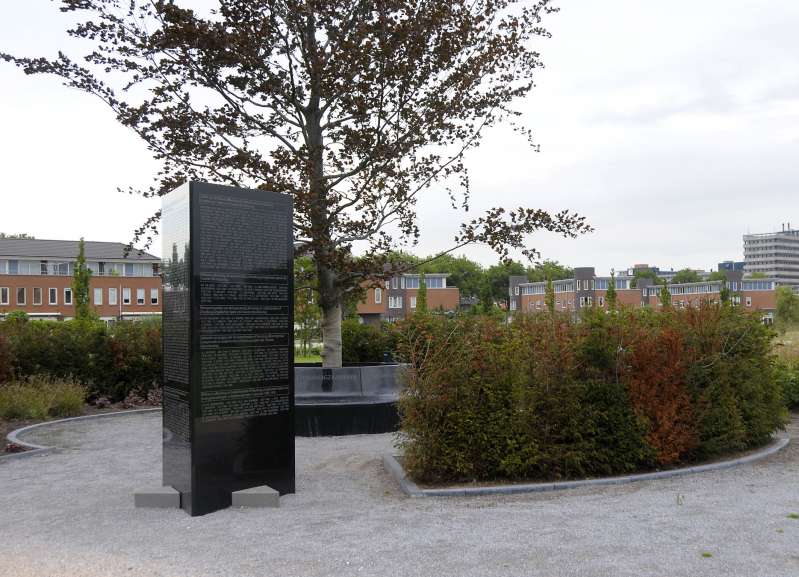
The war memorial at Voorburg /Leidschendam which honours all those who fell during the 2nd world war.The memorial is divided in several sections, of those at home, those at sea, etc. etc. (Photo Courtesy Wikimedia)
In wartime it could take quite some time that letters and other information reached families in occupied Netherlands and hence it is only on 06 July 1943 that the family can announce that Captain Ruygrok had passed away at sea. As there was no body to be buried the only thing that could be done was told hold a Requiem Church service in the town of Voorburg where his wife and children lived.
Sources:
(a) Son: J.C.P. Ruygrok.
(b) Personal Information: E.A Kruidhof & J.C.P. Rugrok
(c) Personnel records (STamboeken) of the Holland America Line as held by the City Archives in Rotterdam
(d) All other photos from the authors archives unless noted differently.
Sailing Time Line: (c)
Date: Function: Ship: Wages and/or remarks.
19 Aug. 1894 Deck Cadet Sloterdijk 20,–
31 Aug. 1913 Temporary dismissed for study 3rd officer.
31 Oct. 1913 Passed exam for 3rd officer.
08 Dec. 1913 Wages increased to 30,–
08 Dec. 1913 4th. Officer Rotterdam 30,–
04 Apr. 1914 4th. Officer Sloterdijk 30,–
07 Oct. 1914 Temporary dismissed due to mobilization of the country. Assigned to the Royal Dutch Navy.
29 Jan. 1915 Wages increased to 60,–
29 Jan. 1915 3rd Officer Maasdijk 60,–
03 Sep. 1915 Wages increased to 70,–
05 Jul. 1916 Temporary dismissed to rejoin the Navy.
29 May 1917 Wages increased to 90,–
29 May 1917 3rd Officer Gorredijk 90.–
01 Jan. 1918 2nd. Officer Gorredijk 100,–
Due to the confiscation of the Gorredijk returned with the Nieuw Amsterdam and on leave.
12 Apr. 1918 Temporary ashore.
10 Jun. 1918 2nd. Officer Noordam 100,-
01 Sep. 1918 Wages increased to 110,-
16 Jun. 1919 Wages increased to 110,–
01 Jul. 1919 Wages increased to 200,-
25 Sep. 1919 2nd Officer Maartensdijk
06 Feb. 1920 2nd Officer Gorredijk
Wages increased to 210,– starting on 1 Jan. 1920
16 Jul. 1920 Temporary ashore for study for 2nd Officer license.
Wages from 1 Jan. 1920 250,–
20 Jul. 1920 2nd Officer Noorderdijk
09 Sep. 1920 Temporary ashore for study 1st officer license.
29 Dec. 1920 Passed exam 1st officer.
30 Dec. 1920 Temporarily ashore.
24 Feb. 1921 2nd Officer Maasdijk 250,-
20 Jul. 1921 2nd Officer Rijndam 250,-
01 Sep. 1921 Wages reduced to 238,–
16 Oct. 1921 Wages reduced to 226,–
24 Mar. 1922 Wages reduced to 220,-
25 Oct. 1922 2nd Officer Volendam 220,-
05 Dec. 1922 Temporarily ashore.
18 Dec. 1922 2nd. Officer Volendam 220,-
25 Jan. 1923 Act. Chief Officer Breedijk 285,-
19 Mar. 1924 Act. Chief Officer Noorderdijk 285,-
01 Jul. 1924 Act. Chief Officer Sommelsdijk 285,-
31 Jul. 1924 2nd Officer 220,- Ashore
12 Aug. 1924 2nd Officer Rijndam 220,-
24 Sept. 1924 Act. chief Officer Poeldijk 285,-
24 Aug. 1926 Act. Captain Poeldijk 285,- Extra premium of 2,– a day
31 Aug. 1926 Act. Chief Officer Poeldijk 285,-
28 Sep. 1926 Temporary ashore on leave.
13 May 1927 Chief Officer Poeldijk 285,- At Antwerp.
Wages increased to 295 starting 04 Apr.1927.
30 Jun. 1927 Act. Captain Poeldijk 560,- At Santos
31 Jul. 1927 Chief Officer Poeldijk 295,- at Santos
03 Sep. 1927 Act. Captain Poeldijk 295,- plus 4,– premium a day
12 Sep. 1927 Chief Officer Poeldijk 295,- At Amsterdam
09 May. 1928 Act. Captain Poeldyk 290,–
22 May. 1928 Chef Officer Poeldyk 295,– At Amsterdam
06 Sept. 1928 Act. Captain Poeldijk 295,– plus 4,– premium a day
15 Sep. 1928 Chief Officer Poeldijk 295,–
25 Sep. 1928 Chief Officer Burgerdijk 295,–
28 Nov. 1928 Chief Officer 295. Ashore
02 Jan. 1929 Chief Officer Binnendijk 295,–
Wages increased to 305,– starting 1 Jan. 29
10 Jan. 1929 Temporary ashore due to illness in St. Franciscus Hospital.
06 Mar. 1930 Wages increased to 315,–
06 Oct. 1930 Chief Officer Bilderdijk 315,– with ship to sea.
29 Aug. 1931 Temporary ashore 315,–
04 Sept. 1931 Chief Officer Nieuw Amsterdam 315,– as passenger.
14 Sep. 1931 Chief Officer Binnendijk 315,– At New York.
13 Feb. 1932 Chief Officer Wages reduced to 262,50
06 Jul. 1932 Temporary ashore 262,50
20 Jul. 1932 Chief Officer Binnendijk 262,50
28 Jun. 1933 Wages reduced with 5% in accordance with circulaire no. 929 dated 27 june 1933
07 Aug. 1933 Chief Officer Dinteldijk 262,50
14 Dec. 1933 Temporary ashore 262,50
16 Dec. 1933 Temporary ashore at 705 262,50
28 Dec. 1933 Wages reduced to 236,50 see circulaire 929 date 27-06-33
28 Dec. 1933 Chief Officer Beemsterdijk 236,50
09 Aug. 1934 Temporary ashore 236,50
21 Aug. 1934 Chief Officer Beemsterdijk 236,50
01 Oct. 1934 Wages reduced to 226,75
21 Jun. 1934 Temporary ashore 226,75 on leave
08 Jul. 1935 Chief officer Edam 226,75
13 Sep. 1935 Chief Officer Bilderdijk 226,75
27 Oct. 1936 Temporary ashore 226,75 on leave
12 Nov. 1936 Chief Officer Bilderdijk 226,75
14 Feb. 1937 Temporary ashore 226,75 mother passed away.
11 Mar. 1937 Chief Officer Spaarndam 226,75
01 Oct. 1937 according to new arrangements 255,25
Gap in Records due to the new HR administration. From 1937 onwards being filed with the Dutch Pension fund which is not accessible for record review.
22 Jun. 1939 Chief Officer Statendam
05 Sep. 1939 Chief officer Statendam
01 Apr. 1940 Chief Officer Volendam 13 may 1942 At Capetown
20 May. 1942 Captain Breedijk (At Capetown)
14 Sep. 1942 Torpedoed near Cape Palmas while on the way to Liverpool and perished at sea.
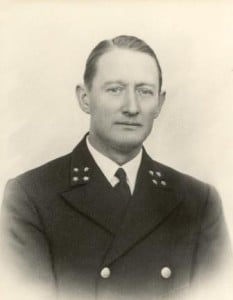

Leave a Reply